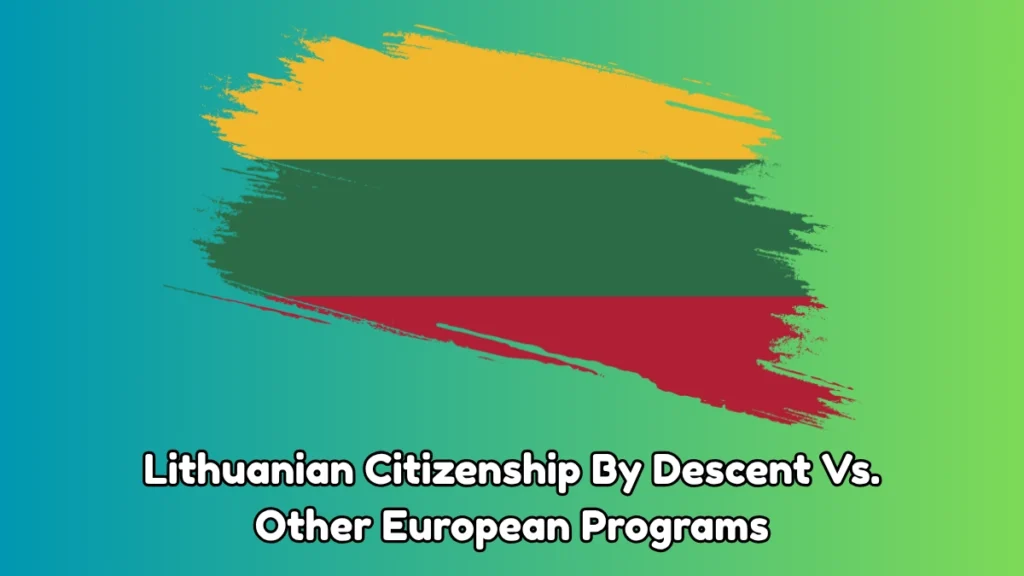As interest in dual citizenship and global mobility continues to rise, many individuals are exploring their European ancestry to determine if they qualify for citizenship by descent. Several EU countries-such as Italy, Poland, Ireland, and Lithuania-offer this path. But how does Lithuanian citizenship by descent compare to other European options?
While the core idea is similar-claiming nationality based on your heritage-there are notable differences in eligibility, bureaucracy, and benefits.

Eligibility Requirements: A Clearer Path in Lithuania
Many countries allow citizenship by descent, but Lithuania’s rules are among the most straightforward if you meet certain historical criteria. To qualify for lithuanian citizenship by descent, your ancestor must have been a Lithuanian citizen before June 15, 1940, and emigrated due to occupation or related reasons. The law permits restoration of citizenship to children, grandchildren, and even great-grandchildren in some cases.
By contrast, Italy offers citizenship jure sanguinis without a generational limit-but their process is notoriously slow and complex, sometimes taking years and requiring court appeals. Ireland allows citizenship through grandparents, but not great-grandparents unless certain conditions are met. Poland also permits citizenship restoration but demands extensive documentation and often years of waiting.
Bureaucracy and Processing Time
One of Lithuania’s biggest advantages is the relatively efficient bureaucracy. Applications typically take between 6 to 12 months. The process is handled by the Migration Department of Lithuania, and supporting services are available in English.
In other countries, the process can be burdened by delays, inconsistent interpretation of laws, and understaffed consulates. This is especially true in Italy and Poland, where local offices may take years to review cases.
Dual Citizenship: A Rare Exception That Works in Your Favor
Another major benefit of lithuanian citizenship by descent is the possibility to retain your current nationality. Lithuania usually prohibits dual citizenship-but makes an exception for people reclaiming citizenship lost due to occupation-related emigration.
By contrast, Poland generally does not object to dual nationality. Italy and Ireland allow it as well. However, Lithuanian law is more explicit in creating a protected path for diaspora descendants, even those whose ancestors naturalized elsewhere.
Lithuanian Citizenship by Descent vs. Other European Programs: Comparison Table
| Feature | Lithuania | Other European Countries |
|---|---|---|
| Eligible Generations | Up to great-grandparent | Varies by country (2nd to unlimited) |
| Ancestral Cut-off | Ancestor must have left before 1990 | Varies: some allow up to 1945, others flexible |
| Required Documents | Birth, marriage, and emigration proof | Similar documents; translations often needed |
| Dual Citizenship | Allowed for descendants | Mostly allowed in EU countries |
| Processing Time | Around 12 months | 6 months to 4 years depending on country |
| Language Test | Not required | Usually not required; few exceptions |
| Application Complexity | Moderate | Depends on country; some easier, some stricter |
| Cost Involved | Low to moderate | Varies: some are free, others charge legal fees |
| Mobility Rights | Full EU rights | Full EU rights in all countries listed |
| Benefits | Dual citizenship, cultural reconnection, EU access | Same benefits across most EU nations |
| Limitations | Strict dates, detailed documentation | Varies: some have generational or residency rules |
Best Use:
This table is ideal for comparing options when claiming European citizenship by descent, especially for those tracing ancestry to Lithuania, Poland, Italy, Ireland, Hungary, or Portugal.
Disclaimer: The information above is based on the latest updates available as of 2025. Rules, eligibility, and timelines may change. Please consult an official government source or legal expert before applying.
“Your bloodline holds more than memories – it holds a passport to Europe. Discover where your ancestry can take you.”
Final Thoughts
While every country has its own rules, Lithuania offers one of the most practical and accessible programs for restoring European citizenship through ancestry. With a clear legal framework, realistic timelines, and access to all EU benefits, Lithuanian citizenship by descent stands out-especially for those who want to reconnect with their roots and unlock the advantages of EU mobility.
If you have Lithuanian ancestry, now may be the time to explore what your heritage can offer you and your family-today and for generations to come.






1 Comment
For example, if you can prove Lithuanian ancestry going back a couple of generations, the process feels much faster and cost-effective. It’s typically under five years and doesn’t require a physical move to Lithuania, which makes it very appealing for folks who value speed and flexibility. Plus, once you have citizenship, you get full mobility within the EU—freedom to live, work, and study anywhere across the bloc without restrictions. That’s a compelling offer.
But on the flip side, residency-based things like Portugal’s Golden Visa or Malta’s investment program provide another type of advantage: you don’t need ancestral ties, and you’re often able to maintain your original citizenship. These paths do come with higher financial requirements—property investments or direct contributions—but they offer broad access and can be more inclusive for people without Deep roots in the region.
I also appreciated the coverage of the complexities—like how long you must reside in the country, whether dual nationality is permitted, and how that plays into your long-term plans. All of those are critical details that people often overlook when they’re drawn in by flashy headlines.